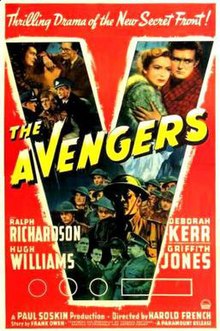|
The Day Will Dawn
The Day Will Dawn, released in the USA as The Avengers, is a 1942 British war film set in Norway during World War II. It stars Ralph Richardson, Deborah Kerr, Hugh Williams and Griffith Jones, and was directed by Harold French from a script written by Anatole de Grunwald, Patrick Kirwan and Terence Rattigan, based on a story by Frank Owen.[1] The music by Richard Addinsell was performed by the London Symphony Orchestra conducted by Muir Mathieson. PlotFollowing the Invasion of Poland in September 1939, the former horse racing-correspondent Colin Metcalfe is placed as a foreign correspondent in neutral Norway. Eight months later he meets a Norwegian fisherman, Captain Alstad, in a sailors' bar, where a scuffle breaks out between British and Norwegian sailors (singing "Rule Britannia", egged on by Metcalfe) and German ones (singing the Nazi Party anthem the "Horst-Wessel-Lied").[2] Alstad takes him aboard his boat during a sea voyage in Norway's territorial waters, during which they sight the Altmark and are fired upon by a German U-boat, despite Norway's neutrality. They then come back to his home port of Langedal, and Metcalfe goes to Oslo to report this to the British embassy there, despite the best efforts of the German Kommandant and the German-sympathising local police chief Ottoman Gunter. There Metcalfe meets Frank Lockwood en route back to England from the Winter War in Finland. It was Lockwood who had got him the foreign correspondent job at the outbreak of war, but he now passes on the news to Metcalfe that he has been fired from it for sailing out with the fisherman rather than staying on dry land where the paper can contact him. Metcalfe informs the embassy, and also warns his paper of signs that a German war on Norway is imminent. Alstad's daughter Kari (who had accompanied them on their voyage) also meets him to tell him of suspicious German merchant ships at Bergen which her father suspects have troops on board. The pair say goodbye and Metcalfe, getting into what he thinks is a taxi, is kidnapped by the Germans and put on board a ship bound for the German port of Bremen. Meanwhile, Germany invades, Metcalfe is scooped on the news of the invasion, and – back in Britain – Chamberlain's government falls and Churchill becomes prime minister. A British warship intercepts the ship on which Metcalfe is held and liberates him but she is re-routed to Cherbourg to help Operation Aerial, the evacuation of British troops from north-western France, before she can get Metcalfe back to Britain. Amidst the carnage on the docks at Cherbourg, Metcalfe finds Lockwood, dying of wounds. Back in Britain as the Blitz begins, Metcalfe is persuaded not to join up and instead to start a press campaign for the public to make economies on the Home Front to help win the Battle of the Atlantic. Just about to set out on it, he is called upon by the Admiralty to be parachute-dropped back into Langedal,[3] sabotage a camouflaged U-boat base nearby, and escape across the border into neutral Sweden. On landing, he is spotted and pursued by the Germans, but manages to escape and gain shelter. There he finds that Alstad has been interned by the Germans, and Kari has brought shame on herself by getting engaged to the traitorous Gunter. However, when at a tense "Norwegian-German friendship dance" the Germans arrive to demand Metcalfe's papers, Kari saves him by inciting a riot and hiding him at her house. There she reveals she only took on the engagement to obtain her father's release. Alstad is released and agrees to help Metcalfe to signal to British bombers with torches to guide them in on their raid on it, and Kari and Metcalfe bid a romantic farewell. The signalling is successful and the base destroyed, but Alstad is killed by a German patrol. Metcalfe returns to tell Kari the news, just as Gunter and the Germans take eight random hostages who will be shot if the British spy they are sheltering is not given up. Metcalfe overhears this, and gives himself up. Gunter returns to Kari to try to save her from the firing squad she too will face for sheltering the spy, but she refuses and is locked up with the hostages, though Gunter shows her the kindness of not separating her from Metcalfe. They prepare to die, and the first party for the firing squad are taken out, but then a British commando raid arrives. In the chaos Gunter is shot by the Kommandant as the latter makes a hasty escape, and the hostages are all freed unharmed. The raiders capture the town and its German garrison and then leave almost immediately, taking Metcalfe, Kari, the hostages and their families to safety in England.[4] CastMain source is the BFI.[5]
Critical receptionTwo reviews written in the 21st century were generally positive. David Parkinson gave the film three out of five stars in the Radio Times, and wrote, "Markedly less restrained than many other British tales of wartime resistance, this well-meaning flag-waver is far more effective than the majority of have-a-go Hollywood movies on the same theme...what sets this apart is a remarkable cast of British stalwarts, not one of whom puts a foot wrong. Special mention should be made, however, of Deborah Kerr, who lends quiet courage to an unrewarding romantic part, and Francis L Sullivan, who makes a most malevolent Nazi".[6] The reviewer for The Movie Scene rated the film similarly, although finding it "incredibly dated," but went on to say that it, "does feature a good storyline which is well knit together. It is still entertaining and you can see how it would have served its purpose of rallying British audiences back in the 1940s."[7] References
External links
|
||||||||||||||||||||||||||||||||
